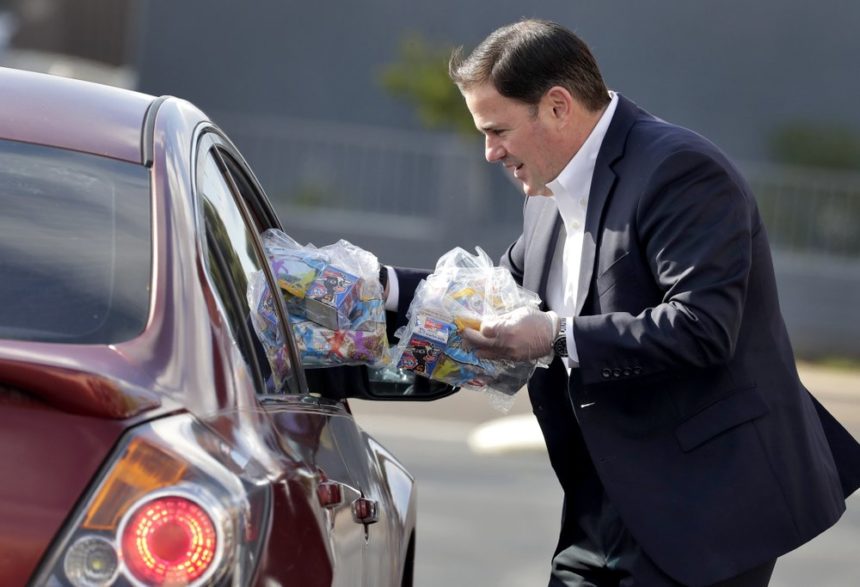Arizona governor calls up National Guard, halts surgeries

PHOENIX (AP) — Arizona Gov. Doug Ducey said Thursday he’s activating the National Guard to help grocery stores and food banks, halting elective surgeries and closing businesses in areas with known cases of COVID-19.
Ducey intensified his response to the coronavirus outbreak under growing pressure from other elected officials to take more aggressive action. His actions came on a day public health authorities reported the biggest day-to-day jump in cases, from 30 to at least 46.
Navajo Nation health authorities late Thursday reported 14 cases on the reservation and issued a “shelter in place” order for people in the Chilchinbeto community to stay home. It was not immediately clear how many of the 14 cases were reflected in the statewide numbers.
The Republican governor said on Twitter his orders will ensure grocery shelves remain stocked and preserve the ability of hospitals to manage an influx of cases. In eight counties with known infections, bars, movie theaters and gyms will be required to close and restaurants will be restricted to takeout and drive-thru service starting Friday.
Restaurants will be able to deliver alcoholic beverages with the purchase of food, an effort to limit the huge financial hit that restaurants are facing.
Ducey also delayed the expiration date for driver’s licenses to ensure people over 65 don’t need to visit the Motor Vehicle Division to renew their license.
“These actions are based on the facts and on data, and come after careful consultation with public health experts from every county in Arizona, our hospitals, local elected officials, and private sector partners,” Ducey wrote on Twitter.
His decision was clearly rushed, coming hours after he made the case for a more incremental approach during a morning news conference. Two hours after it was announced, his office still had not released the formal executive orders spelling out the details.
Ducey had for days recommended that people avoid crowds but stopped short of a statewide mandate for businesses to close or people to stay home. Tempe — a nightlife hotspot — on Thursday joined cities including Phoenix, Tucson, Flagstaff and Sedona that have ordered bars and gyms to close while restaurants offer only takeout or drive-thru service.
Ducey’s delay in acting had echoes of his foot-dragging on closing schools. The second-term governor took that action last Sunday after school district officials across metro Phoenix had ignored his calls from the week before not to close schools to stop the spread of the virus.
“Maybe today is the day we can convince @dougducey to take action and enforce the new WH/CDC guidelines to keep Arizonans safe and save lives. Please help,” Democratic Sen. Kyrsten Sinema wrote on Twitter Thursday morning.
She followed up minutes after Ducey’s announcement: “Turns out, Arizona — today IS the day!!” But she called for Ducey to go farther and expand the business closures statewide.
Half of Arizona’s 44 COVID-19 cases are in Maricopa County. The rest are spread between Coconino, Graham, Navajo, Pima, Pinal, Santa Cruz and Yavapai counties. Public health authorities say the number of confirmed infections will pick up in the coming days as more tests are conducted. The state lab has limited testing supplies but commercial labs are building up their own testing capacity.
For most people, COVID-19 causes only mild or moderate symptoms, such as fever and cough. For some, older adults and people with health problems, it can cause more severe illness, including pneumonia.
Dr. Cara Christ, head of the Arizona Department of Health Services, said some of the patients known to have the disease are elderly and she knew of three people whose symptoms were severe enough to require hospitalization.
The vast majority of people recover from the virus. According to the World Health Organization, people with mild illness recover in about two weeks, while those with more severe illness may take three to six weeks to recover.
The fight to limit the spread of the virus has led to increasingly restrictive attempts to cut down on unnecessary interactions between people. Public health authorities hope aggressive action now will prevent the health care system from being overwhelmed with more sick people than can be effectively treated at once.
That fear has driven the pressure on Ducey to act more forcefully, much of it from Democrats.
“We need bold leadership to save lives,” Dr. Randall Friese, a Democratic Arizona House lawmaker who is a trauma surgeon, said before Ducey’s latest actions were announced. “And we need to look back on this time and say we did too much. We don’t want to look back on this time and say we didn’t do enough.”
Separately, Attorney General Mark Brnovich sent a letter to more than 1,000 financial institutions doing business in Arizona asking them to take a variety of steps to protect borrowers. Those include delaying loan payments, evictions, foreclosures, repossessions and late fees for 90 days. He also asked lenders to temporarily stop reporting late payments to credit bureaus.